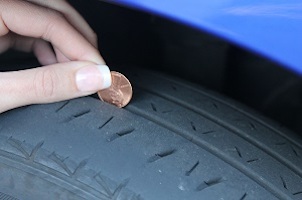Basic Tire Maintenance

A blown tire can ruin more than just your day. Tire trouble can cost you money, time, or even damage your vehicle. Sometimes there is no warning your tire is about to blow. Road debris can cause a sudden puncture and there won’t be much you can do, but most tire issues can be prevented with simple monitoring and maintenance to make your tires last. Check out our list of basic tire maintenance below.
Check Your Tire Pressure
The PSI of your tires varies depending on the type of tire you have and the type of driving you do. Your owner’s manual should contain a recommended PSI for your stock tires or you can check with the manufacturer of your current tire. Normally, PSI should be around 30 to 35. This means there is 30 to 35 pounds of pressure per square inch. All you need is a tire gauge and a few dollars at the air pump to ensure your tires are properly inflated.
Check Your Tread Depth
Proper tire inflation will help prevent uneven wear on your tire tread. Over time the tread on your tires will wear down. This serves as a good indicator you need new tires. To check the tread on your tires all you really need is a penny. That’s right, good old Abe Lincoln can help you with your car maintenance. Simply place a penny into the groove of your tread head down. If you can see all of Lincoln’s head it’s time for new tires.
Check Your Side Walls
At this point, we have checked your tire pressure and your tread depth. Now it’s time to check the sides of your tires for damage and wear. You will be looking for cracks in the rubber, spots which look more worn down and bends in the wheel rim. Damage to your side walls can be the result of poor alignment, low tire pressure or even careless driving habits. If you notice any of the above on your tires, have them repaired or replaced as soon as possible. Thin sidewalls and cracks are the number one cause of blowouts.
Hopefully, your tires are in good shape and ready for the road. Remember to follow these basic maintenance tips and continue to check your tires on a regular basis. A little bit of monitoring and maintenance can go a long way and save you time and money down the road.


